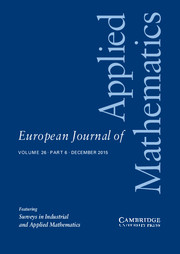Crossref Citations
This article has been cited by the following publications. This list is generated based on data provided by
Crossref.
Han, Zhen
and
Ma, Minhang
2020.
Hip-hop action image recognition based on symmetric algorithm and iterative weighting of dense sampling.
Journal of Ambient Intelligence and Humanized Computing,
Hakim, M.
Ghazdali, A.
and
Laghrib, A.
2020.
A multi-frame super-resolution based on new variational data fidelity term.
Applied Mathematical Modelling,
Vol. 87,
Issue. ,
p.
446.
van Gennip, Yves
2020.
An MBO Scheme for Minimizing the Graph Ohta–Kawasaki Functional.
Journal of Nonlinear Science,
Vol. 30,
Issue. 5,
p.
2325.
Buet, Blanche
Mirebeau, Jean-Marie
van Gennip, Yves
Desquilbet, François
Dreo, Johann
Barbaresco, Frédéric
Leonardi, Gian Paolo
Masnou, Simon
and
Schönlieb, Carola-Bibiane
2020.
Partial differential equations and variational methods for geometric processing of images.
The SMAI Journal of computational mathematics,
Vol. S5,
Issue. ,
p.
109.
Attouchi, Amal
Luiro, Hannes
and
Parviainen, Mikko
2021.
Gradient and Lipschitz Estimates for Tug-of-War Type Games.
SIAM Journal on Mathematical Analysis,
Vol. 53,
Issue. 2,
p.
1295.
Flores, Mauricio
Calder, Jeff
and
Lerman, Gilad
2022.
Analysis and algorithms for ℓ-based semi-supervised learning on graphs.
Applied and Computational Harmonic Analysis,
Vol. 60,
Issue. ,
p.
77.
Liu, Fang
2022.
The eigenvalue problem for a class of degenerate operators related to the normalized $ p $-Laplacian.
Discrete & Continuous Dynamical Systems - B,
Vol. 27,
Issue. 5,
p.
2701.
Mazón, José M.
Solera-Diana, Marcos
and
Toledo-Melero, J. Julián
2023.
Variational and Diffusion Problems in Random Walk Spaces.
Vol. 103,
Issue. ,
p.
235.
Chang, Xiaojun
Rădulescu, Vicenţiu D.
Wang, Ru
and
Yan, Duokui
2023.
Convergence of least energy sign-changing solutions for logarithmic Schrödinger equations on locally finite graphs.
Communications in Nonlinear Science and Numerical Simulation,
Vol. 125,
Issue. ,
p.
107418.
Zhang, Chunjiong
Li, Mingyong
and
Wu, Di
2023.
Federated Multidomain Learning With Graph Ensemble Autoencoder GMM for Emotion Recognition.
IEEE Transactions on Intelligent Transportation Systems,
Vol. 24,
Issue. 7,
p.
7631.
Streicher, Or
and
Gilboa, Guy
2023.
Scale Space and Variational Methods in Computer Vision.
Vol. 14009,
Issue. ,
p.
250.
Liu, Haotian
2023.
Simulation of Computer Image Processing Model Based on Random Forest Algorithm.
p.
191.
Di Pierro, Davide
Ferilli, Stefano
and
Redavid, Domenico
2023.
LPG-Based Knowledge Graphs: A Survey, a Proposal and Current Trends.
Information,
Vol. 14,
Issue. 3,
p.
154.
Yang, Ping
and
Zhang, Xingyong
2024.
Existence and Multiplicity of Nontrivial Solutions for a $(p,q)$-Laplacian System on Locally Finite Graphs.
Taiwanese Journal of Mathematics,
Vol. 28,
Issue. 3,
Calder, Jeff
and
Drenska, Nadejda
2024.
Active Particles, Volume 4.
p.
1.
Adil, Deeksha
Kyng, Rasmus
Peng, Richard
and
Sachdeva, Sushant
2024.
Fast Algorithms for
ℓ
p
-Regression
.
Journal of the ACM,
Vol. 71,
Issue. 5,
p.
1.
Carlini, Elisabetta
and
Tozza, Silvia
2024.
A scheme for the game p-Laplacian and its application to image inpainting.
Applied Mathematics and Computation,
Vol. 461,
Issue. ,
p.
128299.
Yu, Zhangyi
Xie, Junping
and
Zhang, Xingyong
2024.
Existence and multiplicity of solutions for a class of $(p,q)$-Kirchhoff system with combined nonlinearities on graphs.
Boundary Value Problems,
Vol. 2024,
Issue. 1,
van Gennip, Yves
and
Budd, Jeremy
2025.
A Prolegomenon to Differential Equations and Variational Methods on Graphs.
Belkheiri, Yassine
Boudjelal, Abdelwahhab
Elmoataz, Abderrahim
and
Schüpp, Sophie
2025.
Computational Methods for Inverse Problems and Applications.
Vol. 498,
Issue. ,
p.
15.

